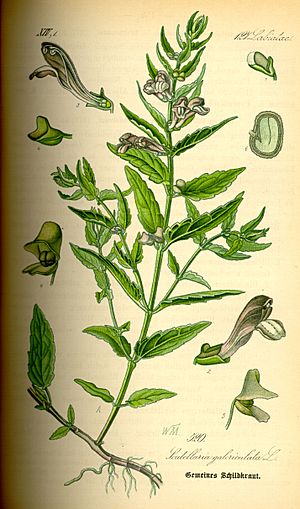Common skullcap facts for kids
Quick facts for kids Common skullcap |
|
|---|---|
 |
|
| 1885 illustration | |
| Conservation status | |
| Scientific classification |
|
| Kingdom: | Plantae |
| Clade: | Tracheophytes |
| Clade: | Angiosperms |
| Clade: | Eudicots |
| Clade: | Asterids |
| Order: | Lamiales |
| Family: | Lamiaceae |
| Genus: | Scutellaria |
| Species: |
S. galericulata
|
| Binomial name | |
| Scutellaria galericulata |
|
| Script error: The function "autoWithCaption" does not exist. | |
Script error: No such module "Check for conflicting parameters".
The Scutellaria galericulata, also known as the common skullcap, marsh skullcap, or hooded skullcap, is a tough plant that grows back every year. It is a type of herb found in many northern parts of the world. You can find it in Europe, Asia, and most of Canada. This plant is part of the mint family.
Common skullcap plants usually grow to be about 20 to 45 centimeters (8 to 18 inches) tall. Some can even reach up to 80 centimeters (31 inches). It loves wet places, so it often grows along fens (a type of wetland) and near water. Its blue flowers are about 1 to 2 centimeters (0.4 to 0.8 inches) long. These flowers grow in pairs and are all on one side of the stem, not at the very top.
The name galericulata comes from Latin and means "hooded." This refers to how the flower's tube is much longer than its calyx (the green parts that protect the bud). Another name, epilobiifolia, means "leaves like willow-herb." This is because its long, thin leaves look a bit like those of the Epilobium plant.
What is a Skullcap?
The Scutellaria group of plants includes over 200 different kinds of skullcaps. Each type can be a bit different. The common skullcap (S. galericulata) is one of these many species. It shares some features with other skullcaps, like the blue skullcap (S. lateriflora).
Historically, some skullcap plants were used in traditional medicine. For example, Native Americans traditionally used blue skullcap as a nerve tonic. They also believed it had calming and diuretic (helping the body get rid of extra water) effects. In Britain and Europe, common skullcap was sometimes used in similar ways. However, it's important to remember that traditional uses are not the same as modern medical treatments. Always talk to a doctor before using any plant for health reasons.
Images for kids
See also

- In Spanish: Casida para niños
 | Kyle Baker |
 | Joseph Yoakum |
 | Laura Wheeler Waring |
 | Henry Ossawa Tanner |



